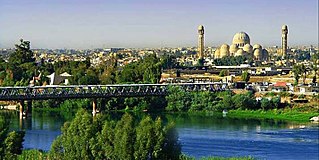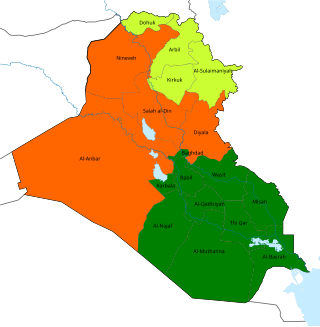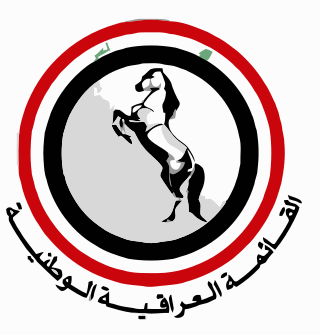
Nineveh or Ninawa Governorate is a governorate in northern Iraq. It has an area of 37,323 km2 (14,410 sq mi) and an estimated population of 2,453,000 people as of 2003. Its largest city and provincial capital is Mosul, which lies across the Tigris river from the ruins of ancient Nineveh. Before 1976, it was called Mosul Province and included the present-day Dohuk Governorate. The second largest city is Tal Afar, which has an almost exclusively Turkmen population.

Duhok is a city in Kurdistan Region, Iraq. It is the capital city of Duhok Governorate.

Barham Salih is an Iraqi Kurdish politician who served as the eighth president of Iraq from 2018 to 2022.

The Iraqi Turkmen Front is a political movement representing the Iraqi Turkmen people. It was founded on April 5, 1995 as a coalition of several Turkmen parties operating within the framework of Iraq's unity. The party aims for the Turkmen community to have greater political involvement, increased recognition and more rights.

The Iraqi Accord Front or Iraqi Accordance Front also known as Tawafuq is an Iraqi Sunni political coalition created on October 26, 2005 by the Iraqi Islamic Party to contest the December 2005 general election. As a large section of Iraq's Sunnis are composed by the populous Kurds, situated in northern Iraq and locally autonomous, the party's members are mostly Arab, and as such, its political efforts have largely been focused on protecting this community's interests as opposed to Iraq's non-Sunni population. In the 2005 election, its platform called for ending the US occupation of Iraq, revision of the new Iraqi constitution, repeal of the de-Ba'athification laws that had cost many Sunnis their government jobs and the restoration of the Iraqi Army, which was dissolved after the US overthrow of Saddam Hussein and which had a Sunni dominated officer corps. Despite this, the party has maintained that it is non-secular, even though the Ba'ath Party contained many prominent Sunnis.

Parliamentary elections were held in Iraq on 15 December 2005, following the approval of a new constitution in a referendum on 15 October.

Osama Abdul Aziz al-Nujaifi is an Iraqi politician and served as one of the three vice presidents of the country, from 2014 to 2015 and 2016 to 2018. As the speaker of the Council of Representatives, the informal leader of the moderate Sunni al-Hadba party was the highest ranking Sunni politician of Iraq.

Governorate or provincial elections were held in Iraq on 31 January 2009, to replace the local councils in fourteen of the eighteen governorates of Iraq that were elected in the 2005 Iraqi governorate elections. 14,431 candidates, including 3,912 women, contested 440 seats. The candidates came from over 400 parties, 75% of which were newly formed.

Parliamentary elections were held in Iraq on 7 March 2010. The elections decided the 325 members of the Council of Representatives who would elect the prime minister and president. The elections resulted in a partial victory for the Iraqi National Movement, led by former Interim Prime Minister Ayad Allawi, which won 91 seats, making it the largest alliance in the Council. The State of Law Coalition, led by incumbent Prime Minister Nouri Al-Maliki, was the second largest grouping with 89 seats.
2008 attacks on Christians in Mosul was a series of attacks which targeted Iraqi Christians in Mosul, Iraq. The Christians of Mosul, who were already targeted during the Iraq War, left the city en masse heading to Assyrian villages in Nineveh Plains and Iraqi Kurdistan. Both Sunni extremists, and Kurdish Peshmerga were blamed for the attacks.

The Nineveh Governorate election of 2009 was held on 31 January 2009 alongside elections for all other governorates outside Iraqi Kurdistan and Kirkuk Governorate.

The Iraqi National Movement (INM), more commonly known as the al-Iraqiya List, was an Iraqi political coalition formed to contest the 2010 parliamentary election by Iraqi Vice President Tariq al-Hashimi's Renewal List, the Iraqi National Accord led by former Prime Minister Iyad Allawi and the Iraqi National Dialogue Front led by Saleh al-Mutlaq. The party included both Shi'a leaders and Sunni leaders and claimed to be secular and non-sectarian.

The Kurdistan Democratic Party, usually abbreviated as KDP or PDK, is the ruling party in Iraqi Kurdistan and the senior partner in the Kurdistan Regional Government. It was founded in 1946 in Mahabad in Iranian Kurdistan. The party states that it combines "democratic values and social justice to form a system whereby everyone in Kurdistan can live on an equal basis with great emphasis given to rights of individuals and freedom of expression."
Since the early 20th century several proposals have been made for the establishment of an autonomous area or an independent state for the Syriac-speaking modern Assyrians in northern Iraq.
The Al Anbar governorate election of 2013 was held on 20 June 2013 alongside elections for Nineveh.

The 2013 Nineveh Governorate election in Iraq was held on 20 June with elections for the Al Anbar Governorate. Due to security problems, turnout was less than half that of the 2009 election. This election saw Sunni Arab parties lose a number of seats to minority parties.

The Uniters for Reform Coalition is a Sunni political coalition in Iraq.
The following lists events that happened during 2014 in Iraq.

Between 1968 and 2003, the ruling Arab Socialist Ba'ath Party of the Iraqi Republic perpetrated multiple campaigns of demographic engineering against the country's non-Arabs. While Arabs constitute the majority of Iraq's population as a whole, they are not the majority in all parts of northern Iraq. In an attempt to Arabize the north, the Iraqi government pursued a policy of ethnic cleansing, killing and forcefully displacing a large number of Iraqi minorities—predominantly Kurds, but also Turkmen, Yazidis, Assyrians, Shabaks and Armenians, among others—and subsequently allotting the cleared land to Arab settlers. In 1978 and 1979 alone, 600 Kurdish villages were burned down and around 200,000 Kurds were deported to other parts of Iraq.

Parliamentary elections were held in Iraq on 12 May 2018. The elections decided the 329 members of the Council of Representatives, the country's unicameral legislature, who in turn will elect the Iraqi president and prime minister. The Iraqi parliament ordered a manual recount of the results on 6 June 2018. On 10 June 2018, a storage site in Baghdad housing roughly half of the ballots from the May parliamentary election caught fire.















